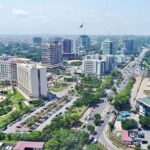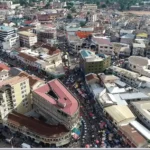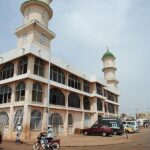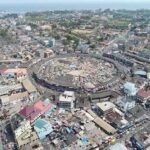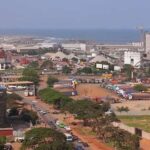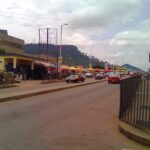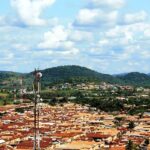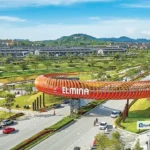Cape Coast
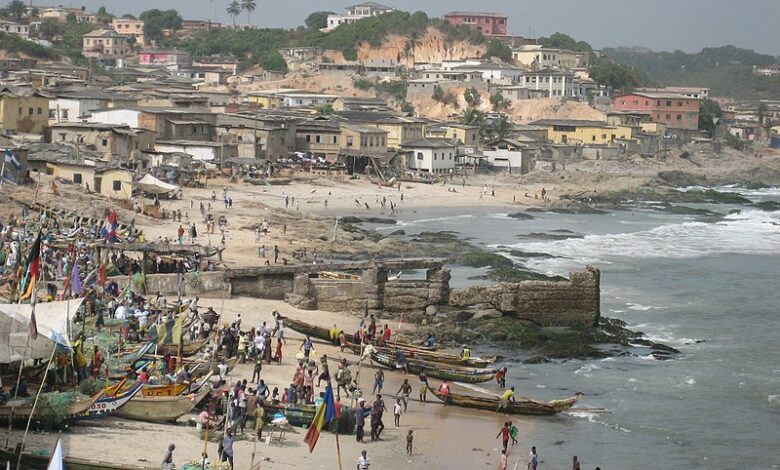
Cape Coast, situated at the heart of Ghana’s coastline, extends from a low promontory into the Gulf of Guinea within the Atlantic Ocean, approximately 75 miles (120 km) southwest of the Ghanaian capital, Accra.
During the 15th century, the Portuguese established a post at this location, and later in the 16th century, the British arrived. The town, among the oldest in the country, developed around Cape Coast Castle, initially constructed by the Swedish in 1655 and later seized by the British in 1663. Functioning as a significant hub for Asante traders, Cape Coast evolved into a roadstead port and served as the commercial and administrative capital of the Gold Coast until 1877, when Accra assumed that role. Cape Coast’s decline commenced in the early 1900s with the construction of railways from Sekondi and Accra to Kumasi.
Although the Cape Coast harbour ceased operations with the establishment of Tema port in 1962, the city maintained its significance as an educational centre, housing several secondary schools and the University of Cape Coast, founded in 1962.
Economic activities in Cape Coast include fishing, trade, and government administration within the Castle. An industrial area was finalized in 1976, contributing to the production of bricks, tiles, tobacco products, cotton textiles, soap, sugar, cocoa products, beverages, salt, and chemicals. Notable structures in the town include Christ Church (1865, the first Anglican church in the country), Wesley Chapel (1838), and the Cathedral of St. Francis, serving as the seat of the Roman Catholic archbishop of Ghana. Additionally, a polytechnic school commenced in 1974, and the Cape Coast Urban Health Centre was completed in 1976. The name “Cape Coast” is a corruption of the Portuguese “Cabo Corso” (Corsican Cape), while the local inhabitants refer to the town as Gua or Oegua. The population was 82,291 in 2000 and 169,894 in 2010.
Map view
More details about Cape coast
| ID |
|---|
| 52168 |
| Name |
| Cape Coast |
| State ID |
| 52 |
| State Code |
| CP |
| State Name |
| Central |
| Country ID |
| 83 |
| Country Code |
| GH |
| Country Name |
| Ghana |
| Latitude |
| 5.10535000 |
| Longitude |
| -1.24660000 |
| WikiData ID |
| Q221283 |
Cape Coast is a city, fishing port, and the capital of Cape Coast Metropolitan District and Central Region of Ghana. It is one of the country's most historic cities, a World Heritage Site, home to the Cape Coast Castle, with the Gulf of Guinea situated to its south. It was also the first capital of Ghana. According to the 2021 census, Cape Coast had a settlement population of 189,925 people. The language of the people of Cape Coast is Fante.
The older traditional names of the city are Oguaa and Kotokuraba (meaning "River of Crabs" or "Village of Crabs"). The Portuguese navigators João de Santarém and Pedro Escobar who sailed past Oguaa in 1471 designated the place Cabo Corso (meaning "short cape"), from which the name Cape Coast derives. From the 16th century to the country's independence in 1957, the city changed hands between the British, the Portuguese, the Swedish, the Danish and the Dutch. It is home to 32 festivals and celebrations.
Cape Coast was founded by the people of Oguaa and the region ruled over by the paramount chief, or Omanhene, is known today as Oguaa Traditional Area. Cape Coast is one of the most historical cities in Ghana. Portuguese colonists built a trading fort in the area. In 1650, the Swedes built a lodge that would later become the better known Cape Coast Castle, which is now a World Heritage Site. Most of the modern town expanded around it. The Dutch took it over in 1650 and expanded it in 1652. It was then captured by the British in 1664.
Trade was an important motivator in the creation of fortresses and settlements on Cape Coast. Traders from various European countries built these trading lodges, forts and castles along the coast of modern Ghana. Unfortunately, the acquisition of gold, slaves, honey, and the many other goods that composed the African leg of the Triangular Trade was increasingly detrimental to the inhabitants of Cape Coast. In 1874, the British dominated all European presence along the coast of modern-day Ghana using Cape Coast as their base of operations, Gold Coast.
In the 19th century, concerns over Cape Coast's climate prompted discussions about relocating the headquarters to Accra, seen as a healthier alternative. Colonel Henry Ord's report in 1865 highlighted Accra's appeal, but an earthquake in 1862 damaged key government buildings, thwarting plans. By the 1870s, Cape Coast's climate and sanitation issues persisted, leading to consideration of alternatives such as Ada, Elmina, and Accra. Despite Elmina's drawbacks, Accra's advantages, including its commercial significance and relatively healthy surroundings, outweighed its shortcomings. Ultimately, in 1875, the decision was made to move the Gold Coast Colony's headquarters to Accra.
With the establishment of formal colonial administration, they relocated to Accra following opposition to the "window tax" in 1877. Accra became their state. Cape Coast Castle was also where most of the slaves were held before their journey on the Middle Passage.
Oguaa Traditional Area has seven asafo companies – traditional warrior groups, based on lineal descent, whose historical role was defence of the state (the word deriving from sa, meaning "war", and fo, meaning "people") – with a complex social and political organization based on martial principles, and elaborate traditions of visual art. The asafo companies feature largely in Cape Coast's annual Fetu Afahye festival held on the first Saturday of September, and each have historically established uniform colours: Esi Sutherland-Addy identifies these as: No. 1. Bentsir – red; No. 2. Anafo – blue and white; No. 3. Ntsin – green; No. 4. Nkum – yellow; No. 5. Amanful – wine and black; No. 6. Abrofomba (Brofo Nkoa) – white; No. 7. Ankrampa – white and black.
The city's St. Francis Cathedral was dedicated in 1928. The building is the first Catholic Cathedral built in Ghana. In addition, one of the first Catholic schools in Ghana, St. Augustine College, was established in Cape Coast during 1936. The cocoa marketing boom of the 1900s that Ghana experienced, the city experienced a certain period of economic prosperity. After the completion of harbours and railways in other parts of the country such as Sekondi and Kumasi, cocoa cultivation and trade in Ghana diversified and Cape Coast lost some importance. However, after the establishment of the Roman Catholic Archdiocese and the university of the city in 1950 and 1962 respectively, Cape Coast became a regional educational hub for this area of Ghana.
There are Public Transports from Cape Coast to major cities such as Accra; Kumasi, Mim, Ahafo; Sunyani; Tamale; Tema; Ho; Wa; Bolgatanga; Elubo; Aflao, Techiman.
Cape Coast is the only Metropolitan Assembly in the Central Region. The Assembly is bounded to the south by the Gulf of Guinea, west by the Komenda Edina Eguafo Abrem, East by the Abura Asebu Kwamankese District, and to the north by the Twifu Heman Lower Denkyira District. It also has two Parliamentary constituencies, which are Cape Coast North (Ghana parliament constituency) and Cape Coast South (Ghana parliament constituency). The Assembly has 45 Electoral Areas, with 30 being in Cape Coast South (Ghana parliament constituency) and 15 being in Cape Coast North (Ghana parliament constituency).
The area is dominated by batholith rock and is generally undulating with steep slopes. There are valleys of various streams between the hills, with Kakum being the largest stream.
The minor streams end in wetlands, the largest of which drains into the Fosu Lagoon at Bakano. In the northern part of the district, however, the landscape is suitable for the cultivation of various crops.
Cape Coast has a tropical savanna climate (Köppen: Aw/As) with two long wet seasons – a heavier one from March to July and a lighter one from September to November – alongside two short dry seasons in January/February and in August.
Cape Coast is a humid area with mean monthly relative humidity varying between 85% and 99%. The sea breeze has a moderating effect on the local climate.
The crab is the city's mascot and a statue of one stands in the city centre. Fort William, built in 1820, was an active lighthouse from 1835 to the 1970s, while Fort Victoria was built in 1702.
The main market of Cape Coast is called Kotokuraba Market.
Other attractions include a series of Asafo shrines, Cape Coast Centre for National Culture, the Oguaa Fetu Afahye festival (held on the first Saturday of September), and since 1992, the biennial Panafest theatre festival. The city is located 30 km south of Kakum National Park, one of the most diverse and best preserved national parks in West Africa.
It is believed that Michelle Obama, US First Lady, considers Cape Coast as her ancestral home, and on 11 July 2009, she took the rest of the first family to tour Cape Coast Castle as part of her husband's trip to Cape Coast.
Cape Coast is the seat of the University of Cape Coast (UCC), Ghana's leading university in teaching and research. Cape Vars, as it is popularly called, lies on a hill overlooking the Atlantic Ocean. It also has one of the best Polytechnics, the Cape Coast Polytechnic (C-POLY). The city also boasts some of Ghana's finest secondary and technical schools:
- Wesley Girls' High School
- St. Augustine College
- Holy Child High School, Ghana
- Mfantsipim School
- Adisadel College
- Aggrey Memorial Senior High School
- Ghana National College
- Mfantsiman Girls' Senior High School
- Edinaman Senior High School
- Cape Coast Technical Institute
- Asuansi Technical Institute
- Academy of Christ the King Senior High School
- Cape Coast International Senior High School
- University Practice Senior High School
- St. Nicholas Seminary Senior High School
- Efutu Senior High Technical School
- Sammo Senior High School
- Commercial Service Institute (CSI)
- Oguaa Senior High Technical School
Notable people born in or associated with Cape Coast include:
- John Atta Mills: 1944-2012 former President of Ghana
- Frederick Acheampong: (born 1978); member of Ghana Football Association's Executive Council.
- Kwesi Bekoe Amissah-Arthur:1951– 2018; former vice-president of the Republic of Ghana.
- Samuel Richard Brew Attoh-Ahuma: 1863–1921; clergyman, nationalist, pioneering Pan-Africanist.
- Kofi Bentsi-Enchill: 1895–1948; textiles tycoon, philanthropist.
- Prince James Hutton Brew: 1844–1915; solicitor.
- Kwesi Brew: 1928–2007; poet and diplomat.
- Joseph Peter Brown: 1843–1932; patriot, statesman.
- Margaret Busby, OBE, also titled Nana Akua Ackon I: 1944–; publisher, editor, writer and broadcaster. Enstoolment in 1999.
- Kwadwo Egyir, slave trader and tribal chief. Also involved in colonial diplomatic missions.
- J. E. Casely Hayford: 1866–1930; author, lawyer, politician and educator.
- James Cheetham: 1834–1902; merchant, member of the Legislative Council of the Gold Coast.
- Ambrose Thompson Cooke: 1930–; millionaire, industrialist, textiles CEO and entrepreneur. Alumni London School of Economics and St Augustine's College Cape Coast
- Sir James Henley Coussey, KBE: 1895–1958; High Court judge, chairman of the Coussey Commission, president of the West Africa Court of Appeal.
- John Coleman de-Graft Johnson: 1884–1956; secretary of Native Affairs, anthropologist.
- Samuel George Duker: 1905–1994; LRCP Edin, LRCS Edin, LRFPS Glasg; pioneering physician
- King John Aggery Essien: 1809–1899; King of Cape Coast, pioneer Pan-Africanist.
- Nana Amba Eyiaba I: 1950–; Queen mother of Effutu 16 of the Effutu Municipal District, educator and advocate for political rights of queen mothers
- Francis Chapman Grant: 1823–1889; founding member of the Fanti Confederation; cousin of Ulysses Grant.
- Charles Emmanuel Graves: 1884–1929; musicologist, composer.
- Mark Christian Hayford: 1863–1935; author, founder of Gold Coast Baptist Church and the Christian Army of the Gold Coast
- Robert Hutchison: 1828–1863; statesman, soldier, philanthropist.
- Prophet Jemisimiham Jehu-Appiah: 1892–1948; founder of Musama Disco Christo Church in Africa.
- Thomas Frederic Edward Jones: 1850–1927; petitioned Queen Victoria about Lands Bill.
- The poet and writer, Letitia Elizabeth Landon, arrived with her husband George MacLean in 1838 and died here shortly after, on 15th October of that year. She is buried in Cape Coast Castle.
- John Mensah-Sarbah: 1864–1910; barrister, author, published Fanti Customary Laws.
- Henry Mercer-Ricketts: 1895–1980; pioneering physician.
- George Edward Moore: 1879–1950; recipient of the Ashanti Medal, executive member of the Aborigines' Rights Protection Society.
- Hon. Ebo Barton Odro, First Deputy Speaker of the Sixth Parliament of the Fourth Republic
- Andrew William Parker: 1840–1912; conscientious nationalist, fought in the Ashanti expedition.
- Philip Quaque: 1741–1816; first ordained African clergy of the Church of England.
- John Sarbah: 1834–1892; educationist, merchant, industrialist.
- William Esuman Gwira Kobina Sekyi: 1892–1956; lawyer, politician, author.
- Jacob Wilson Sey, alias Kwaa Bonyi: 1832–1902; millionaire, philanthropist, founding member of the Aborigines' Rights Protection Society.
- Efua Sutherland: 1924–1996; writer, dramatist, educationalist and cultural activist
- James Robert Thompson: 1810–1886; pioneering educationist.
- Peter Turkson: 1948–; Cardinal-Archbishop of Cape Coast.
- Herbert Taylor Ussher: 1836–1880; early administrator
- Henry van Hien: 1858–1928; President of the Aboriginal Rights Protection Society.
- Hon. William Ward-Brew, OBE: 1878–1943; lawyer, VP of Aborigines' Rights Protection Society.
- Herbert Winful: 1952–; engineering professor.
- Kastle FM
- Asaase Radio
- Cape FM
The Fante people of Ghana are notable for their way of cooking. They are known for eating rich cuisine, mostly with more fish, meat, or any form of protein than necessary. It is believed that this is because of the number of rivers and lakes situated in the town. The people are known for their expert fishing and fish preservation abilities. Some of the cuisines are fante fante, stew and pepper sauce or okro stew, fante kenkey, which can be eaten with soups, stews or shito.
List of sister cities of Cape Coast, designated by Sister Cities International:
- Cape Coast Castle
- Charles Tetty, "Medical Practitioners of African Descent in Colonial Ghana", International Journal of African Historical Studies, Vol. 18, No. 1 (1985), pp. 139–44, Boston University African Studies Center.
- Gallery of Gold Coast Celebrities 1632–1958, Vol 1 2 & 3; I.S. Ephson, Ghana Publishing Corporation, 1970.
- Kofi Baku, "Kobina Sekyi of Ghana: An Annotated Bibliography of His Writings", International Journal of African Historical Studies, Vol. 24, No. 2 (1991), pp. 369–81, Boston University African Studies Center.
- Cape Coast travel guide from Wikivoyage
- Ghana-pedia webpage – Cape Coast
References
- http://www.businesstimesafrica.net/btm/details.cfm?prodcatID=6&tblNewsCatID=4&tblNewsID=167
- http://www.statsghana.gov.gh/docfiles/2010phc/Census2010_Summary_report_of_final_results.pdf
- http://www.centralregion.gov.gh/index.php?option=com_k2&view=item&id=43:capecoast&Itemid=135
- http://www.myweather2.com/City-Town/Ghana/Cape-Coast/climate-profile.aspx
- https://viaf.org/viaf/152450213
- https://d-nb.info/gnd/4085146-1
- https://www.ghanaweb.com/GhanaHomePage/geography/cape-coast.php
- https://theculturetrip.com/africa/ghana/articles/11-fascinating-things-to-know-about-ghanas-cape-coast/
- https://web.archive.org/web/20110726102427/http://www.ghana-pedia.org/org/index.php?option=com_directory&listing=Cape%20Coast&page=viewListing&lid=24&Itemid=36
- https://web.archive.org/web/20140908153539/http://cwtlgh.org/nana-amba-eyiaba-I
